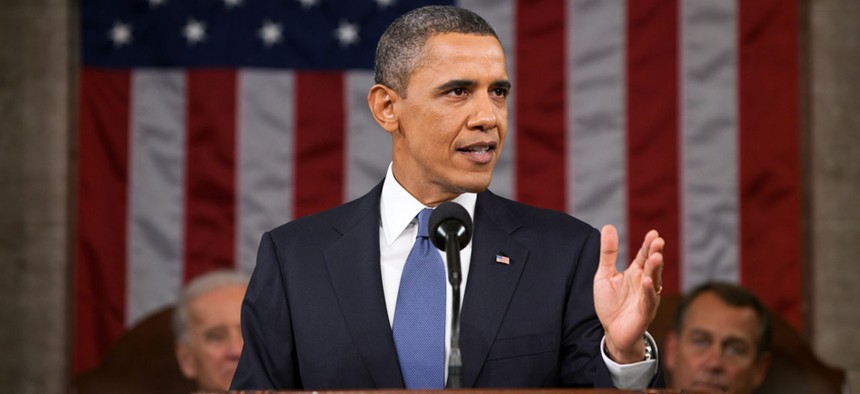
Obama delivers his 2011 State of the Union address. Pete Souza/White House file photo
Obama's State of the Union and the Decline of the Bully Pulpit
President Obama’s eloquence was praised on the campaign trail. Why hasn't it translated into more policy achievements?
As President Obama prepares to deliver his final State of the Union address, many Americans still wonder why his eloquence on the campaign trail didn’t translate into a greater ability to build support for his proposals once he took office. The explanation for this apparent disconnect between the president’s rhetorical prowess and results is not a shortcoming particular to Obama. Rather, it is the impotency of the so-called “bully pulpit” which he commands.
When Teddy Roosevelt coined the term, he did not intend for the phrase to contain negative implications; in the vernacular of his day, “bully” meant first-rate or excellent, reflecting his estimation that with the office came an opportunity to reach a vast audience. Today, the bully pulpit is widely held to impart significant advantage to presidents by equipping them with a powerful megaphone to persuade the American people and other political actors to support their positions. The platform is perceived to be especially potent because it is a prerogative all the president’s own, unencumbered by other branches of government. No member of Congress or Supreme Court justice can vet his prose.
Over the last century, presidents have availed themselves of this tool more than ever. The scholar Jeffrey Tulis found that 19th century presidents, on average, delivered about 10 speeches each year. According to CBS News, Obama delivered 411 speeches, comments, and remarks in his first year in office. And yet, scholars Raymond Tatalovich and Thomas S. Engeman have noted that “it is accepted wisdom that any president’s popularity will exhibit secular decline over the four-year term.” Presidents haven’t had great luck persuading Congress, either. The scholar George C. Edwards III studied 287 presidential legislative initiatives that he deemed to potentially significant and found that 41 percent became law. In other words, presidents lose most of the time.
Why haven’t modern presidents had more success harnessing the bully pulpit to achieve their goals? First, the president rarely speaks directly to the American people. Edwards says that the only circumstances in which the president is likely to do so are during the State of the Union address and in the midst of scandals or military actions. Presidents used to be able to command network television coverage when they wished to address the American people, but, according to Edwards, that changed after a “network rebellion” began in the 1970s. Since then, the White House has faced an uphill battle in convincing networks to interrupt programming. As a result, rather than hearing from the president directly, the American people often come to learn about his messages through the filter of journalists. Of course, the president lacks the ability to control the tone and content of such coverage. As the journalist Sebastian Mallaby has argued, “the bully pulpit has been drowned out by bullying pundits.”
The rise in punditry has coincided with heightened investigation into— and criticism of—presidential claims. While through the 1960s many reporters saw their jobs as being to convey the words of the president, the Watergate scandal and Vietnam War ushered in a new era of media scrutiny. Presidential statements no longer go uncontested; rather, a cadre of political and investigative journalists intensively question, fact-check, and challenge presidential communications. Gone are the days when reporters simply turned their heads, like they did when Franklin D. Roosevelt’s campaign train stopped so that he could visit his mistress Lucy Mercer in Allamuchy, New Jersey.
On the relatively rare occasions when presidents have the opportunity to speak directly to the American people, many citizens simply tune him out. Fewer than 32 million Americans watched the 2015 State of the Union address. By way of comparison, 114.4 million Americans watched the Super Bowl last year. While the growth of the mass media has created more overall opportunities for presidents to communicate, it has also created more distractions and competition–— from cable TV to social media.
But even when Americans do listen to the president, they’re rarely persuaded. Edwards found that televised presidential addresses are rarely followed by statistically significant changes in approval ratings. His studies of presidents who are widely considered to be skilled communicators, such as Kennedy, Reagan, and Clinton, showed that even these leaders could not alter public moods in favor; they could only contribute to and benefit from the moods that already existed in the nation.
Most Americans develop a party affiliation by adulthood and political predispositions and partisan attitudes tend to remain consistent throughout an individual’s life. Americans are therefore primed to draw positive impressions of the communications of presidents whom they like and negative impressions of the messages of politicians whom they do not support—regardless of what the president is actually saying.
Scholars have also noted that the modern practice of litigating every issue in the press forces politicians to state their views early—perhaps before the facts are fully studied. This can make it more difficult to later back down from the positions they have staked in order to accept reasonable compromises. Debating in public may also preclude the candid behind-the-scenes discussions, which facilitate deals. As James Madison famously declared, “no Constitution would ever have been adopted by the [Constitutional] Convention if the debates had been made public.”
The bully pulpit is simply not the powerful weapon that Roosevelt portrayed it to be. Obama’s—and other contemporary presidents’—use of the bully pulpit has actually been correlated with declining public support and an inability to achieve key goals. Roosevelt would be speechless.
NEXT STORY: The Gun-Control Rift Exposed by Obama






